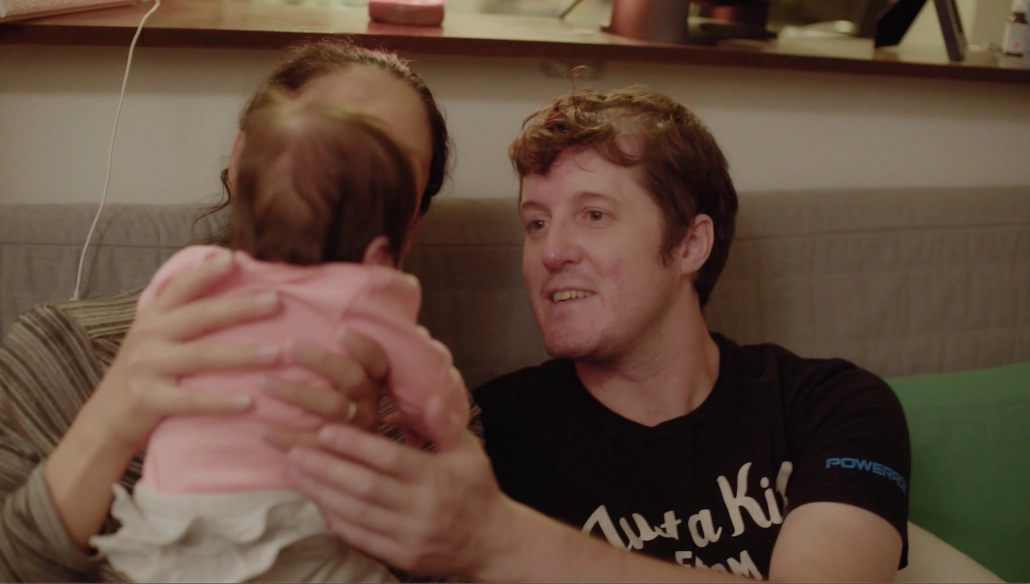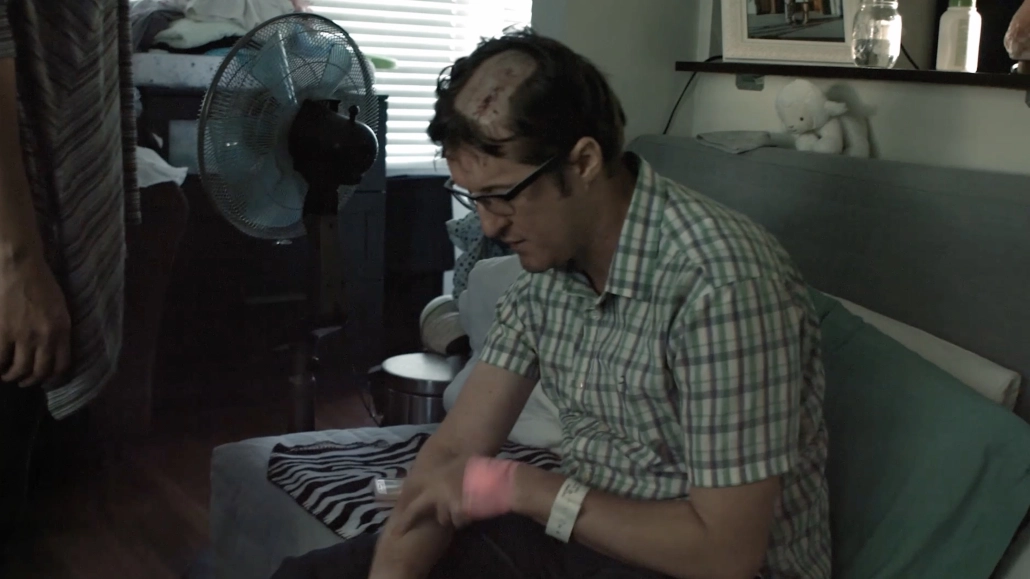SCA alum perseveres in documentary
Derek Dabkoski will screen ‘Derek Changes His Mind’ at L.A. Live this Sunday.
Derek Dabkoski will screen ‘Derek Changes His Mind’ at L.A. Live this Sunday.

In 2006, Derek Dabkoski was shooting his thesis film as an undergraduate student at New York University. After wrapping a day of shooting in San Francisco, he was walking home from celebrating with his team. Just one block away from his parents’ house, a group of men threw him into a van and beat him up before throwing him back onto the pavement. Dabkoski fell on his head.
This incident resulted in a traumatic brain injury that left him partially paralyzed on the right side of his body.
In 2016, Dabkoski was working towards a Master of Fine Arts in film and television production at USC. His wife, Nadia Dabkoski, picked up the USC Trojan Family magazine, which had an article about a Keck Medicine of USC clinical trial regarding stem cell implantation treatment for people with spinal cord injuries.
While his TBI affects him differently than a spinal injury would, Derek Dabkoski called Keck Medicine for possible treatments. They referred him to a study by the University of California, San Francisco that would inject stem cells into the left hemisphere of his brain, with the goal of giving him some of his mobility back.
Dabkoski’s first thought was an unusual one, though maybe not far off for a documentarian: This would make a good movie.
“[Derek called me and] said, ‘I just enrolled in an experimental stem cell surgery study to try and fix my neuro damage, because I’m about to have a baby with my wife who can’t get her green card. Do you think that’s a movie?’” said Ian McClellan, who graduated from USC with Dabkoski in 2016. “I said, ‘Yes, I think that’s a movie.’ So we started filming his story.”
The footage turned into the award-winning documentary “Derek Changes His Mind,” which explores the stem cell treatment as it affected Dabkoski and his family, evolving into a story about their growing lives together. The film will be screened at L.A. Live on Sunday as part of the Awareness Film Festival.
While Dabkoski acknowledges the trauma and anguish he endured, the documentary’s tone remains lighthearted.
“I should have told Nadia it was a breakdancing injury,” he quips in the voiceover.
The title of the documentary itself, “Derek Changes His Mind,” is a tongue-in-cheek reference to both the stem cell treatment changing Dabkoski’s brain and the way the documentary becomes about more than his clinical trial.
“It first started off as a study of what can the medical experiment do for my physical well-being,” Dabkoski said, “but it quickly evolved into something greater than that — a story about family in the face of numerous different obstacles, and how we bonded together to create a tight-knit family.”
Dabkoski began the stem cell clinical trial in 2017. For the past six years, he worked meticulously with McClellan as his co-producer and former USC classmate Im Joong Kim as the cinematographer to create “Derek Changes His Mind.”
“Living in his world for a year, you realize that there’s not the level of help that disabled people need,” McClellan said. “There’s little gestures from organizations and people throughout the day, but disabled people are disabled all the time. You see how hard it was for him to get by and live just the normal life that most people are able to take for granted.”

The documentary includes slices of the life of Dabkoski and his family as they deal with the clinical trial, his wife’s pregnancy and the fight to secure her green card. Kim explained that their one-camera set-up gave the documentary an intimate, naturalistic feel.
“Throughout the process, sometimes you just have to let go,” Kim said. “That is part of the big learning process of documentaries, [finding] a story within the footage.”
Dabkoski personally edited and narrated the documentary, which became a therapeutic way for him to face the effects of his TBI.
“I was able to look at that period of time in my life from a more objective standpoint and decompress everything that went on and put it in order in a way that made me feel comfortable with what I had gone through,” Dabkoski said.
His narration helped him reclaim the easygoing independence that his injury took away. Dabkoski tells the viewer jokes, points out ironic moments and calls his wife’s verbal slip-ups “Nadiaisms.”
“It’s a funny feeling I get, seeing your child develop their motor skills at the same time you are,” he tells the viewer. “But that’s the hand I was dealt, I guess. Pun intended.”
“Derek Changes His Mind” has garnered acclaim at nine film festivals internationally, including winning the Voices of Ability Award from the Portland Film Festival and Best Director from the Courage Film Festival in Berlin.
“It’s not like a popcorn movie; it’s not a slasher thriller,” McClellan said. “I think we’ve resonated the most with compassionate audiences that celebrate having kept those feelings [of pain and hardship].”
While Dabkoski celebrates these awards wholeheartedly, he said he is most proud of being able to share his family’s story.
“Despite certain things that may have broken our hearts, we were able to get through them,” Dabkoski said. “I hope that this can continue to foster that sense of positivity within the greater community, not only within the disability community but with a larger group as well.”
“Derek Changes His Mind” will be screened Sunday, Oct. 8 at 1:30 p.m. at L.A. Live Regal Cinemas.
We are the only independent newspaper here at USC, run at every level by students. That means we aren’t tied down by any other interests but those of readers like you: the students, faculty, staff and South Central residents that together make up the USC community.
Independence is a double-edged sword: We have a unique lens into the University’s actions and policies, and can hold powerful figures accountable when others cannot. But that also means our budget is severely limited. We’re already spread thin as we compensate the writers, photographers, artists, designers and editors whose incredible work you see in our daily paper; as we work to revamp and expand our digital presence, we now have additional staff making podcasts, videos, webpages, our first ever magazine and social media content, who are at risk of being unable to receive the compensation they deserve.
We are therefore indebted to readers like you, who, by supporting us, help keep our paper daily (we are the only remaining college paper on the West Coast that prints every single weekday), independent, free and widely accessible.
Please consider supporting us. Even $1 goes a long way in supporting our work; if you are able, you can also support us with monthly, or even annual, donations. Thank you.
This site uses cookies. By continuing to browse the site, you are agreeing to our use of cookies.
Accept settingsDo Not AcceptWe may request cookies to be set on your device. We use cookies to let us know when you visit our websites, how you interact with us, to enrich your user experience, and to customize your relationship with our website.
Click on the different category headings to find out more. You can also change some of your preferences. Note that blocking some types of cookies may impact your experience on our websites and the services we are able to offer.
These cookies are strictly necessary to provide you with services available through our website and to use some of its features.
Because these cookies are strictly necessary to deliver the website, refusing them will have impact how our site functions. You always can block or delete cookies by changing your browser settings and force blocking all cookies on this website. But this will always prompt you to accept/refuse cookies when revisiting our site.
We fully respect if you want to refuse cookies but to avoid asking you again and again kindly allow us to store a cookie for that. You are free to opt out any time or opt in for other cookies to get a better experience. If you refuse cookies we will remove all set cookies in our domain.
We provide you with a list of stored cookies on your computer in our domain so you can check what we stored. Due to security reasons we are not able to show or modify cookies from other domains. You can check these in your browser security settings.
These cookies collect information that is used either in aggregate form to help us understand how our website is being used or how effective our marketing campaigns are, or to help us customize our website and application for you in order to enhance your experience.
If you do not want that we track your visit to our site you can disable tracking in your browser here:
We also use different external services like Google Webfonts, Google Maps, and external Video providers. Since these providers may collect personal data like your IP address we allow you to block them here. Please be aware that this might heavily reduce the functionality and appearance of our site. Changes will take effect once you reload the page.
Google Webfont Settings:
Google Map Settings:
Google reCaptcha Settings:
Vimeo and Youtube video embeds:
The following cookies are also needed - You can choose if you want to allow them:
